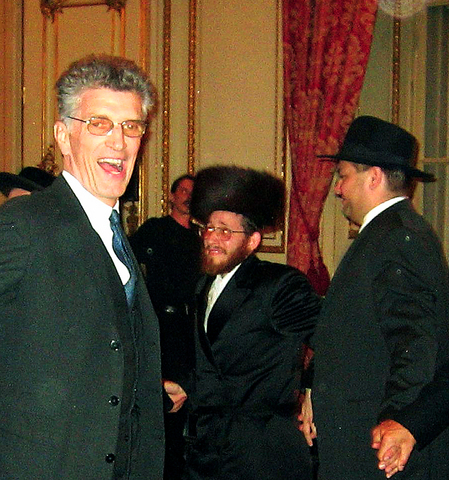Even for one of Europe's quirkier capitals, it was a bizarre spectacle -- a far-right politician who has questioned the existence of Nazi gas chambers noshing on salmon pate at a bar mitzvah and tapping his foot to wildly pulsating Hasidic music.
"The rabbi is a good friend of mine," John Gudenus said of his host. "Why, we've even had him over to the house!"
They make strange bedfellows from opposite fringes -- ultra-rightists and ultra-Orthodox Jews, joined in an alliance for diverging ends.

PHOTO: AP
Brooklyn-born Moishe Arye Friedman says he's chief rabbi for hundreds of anti-Zionist orthodox Jews in Vienna. He wants formal state recognition of his religious community, and thinks the rightists can help. Gudenus and his cohorts say they have no hidden agenda in supporting Friedman's cause -- but they may have something to gain from it.
"For people like this, being seen with an orthodox Jew is an attempt to gain some legitimacy," says Wolfgang Neugebauer, the recently retired head of the publicly funded office that tracks neo-Nazi trends in Austria. "They try to create an `alibi Jew' to escape accusations of anti-Semitism."
The rightists sorely need positive publicity.
Their Freedom Party, which shocked Europe in 1999 by winning enough election votes to merit a place in government, is on the ropes after its less extreme wing bolted to form its own party this year.
Even as Austria struggles to come to grips with the country's part in the Holocaust during the time it was annexed to Hitler's Third Reich, the hard-liners continue to provoke uproar by sounding like apologists for the Nazis.
Just last month, Gudenus declared anew that whether the gas chambers existed should be "seriously debated."
Last week he amended that view to "there were gas chambers, though not in the Third Reich but in Poland."

PRECARIOUS RELATIONS: Commentators in Saudi Arabia accuse the UAE of growing too bold, backing forces at odds with Saudi interests in various conflicts A Saudi Arabian media campaign targeting the United Arab Emirates (UAE) has deepened the Gulf’s worst row in years, stoking fears of a damaging fall-out in the financial heart of the Middle East. Fiery accusations of rights abuses and betrayal have circulated for weeks in state-run and social media after a brief conflict in Yemen, where Saudi airstrikes quelled an offensive by UAE-backed separatists. The United Arab Emirates is “investing in chaos and supporting secessionists” from Libya to Yemen and the Horn of Africa, Saudi Arabia’s al-Ekhbariya TV charged in a report this week. Such invective has been unheard of

US President Donald Trump on Saturday warned Canada that if it concludes a trade deal with China, he would impose a 100 percent tariff on all goods coming over the border. Relations between the US and its northern neighbor have been rocky since Trump returned to the White House a year ago, with spats over trade and Canadian Prime Minister Mark Carney decrying a “rupture” in the US-led global order. During a visit to Beijing earlier this month, Carney hailed a “new strategic partnership” with China that resulted in a “preliminary, but landmark trade agreement” to reduce tariffs — but

SCAM CLAMPDOWN: About 130 South Korean scam suspects have been sent home since October last year, and 60 more are still waiting for repatriation Dozens of South Koreans allegedly involved in online scams in Cambodia were yesterday returned to South Korea to face investigations in what was the largest group repatriation of Korean criminal suspects from abroad. The 73 South Korean suspects allegedly scammed fellow Koreans out of 48.6 billion won (US$33 million), South Korea said. Upon arrival in South Korea’s Incheon International Airport aboard a chartered plane, the suspects — 65 men and eight women — were sent to police stations. Local TV footage showed the suspects, in handcuffs and wearing masks, being escorted by police officers and boarding buses. They were among about 260 South

Chinese President Xi Jinping’s (習近平) purge of his most senior general is driven by his effort to both secure “total control” of his military and root out corruption, US Ambassador to China David Perdue said told Bloomberg Television yesterday. The probe into Zhang Youxia (張又俠), Xi’s second-in-command, announced over the weekend, is a “major development,” Perdue said, citing the family connections the vice chair of China’s apex military commission has with Xi. Chinese authorities said Zhang was being investigated for suspected serious discipline and law violations, without disclosing further details. “I take him at his word that there’s a corruption effort under